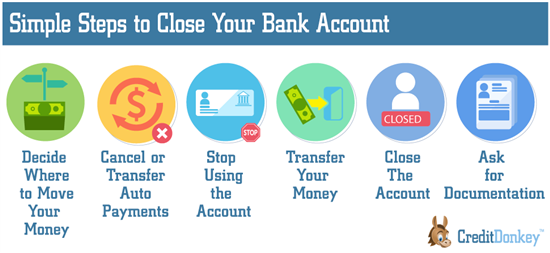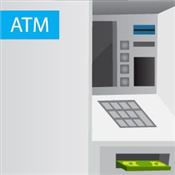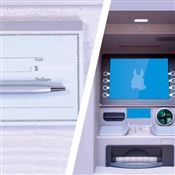How to Close a Bank Account
Closing a bank account doesn't need to be complicated. Find out how to handle the process easily and the best ways to avoid any fees below.
 |
Many people put off closing a bank account because they expect a hassle. Others worry about losing money to fees or hidden charges. And some fear what may happen once they lose access to their account.
You can avoid any banking-related stress by following a few simple steps before closing your account. The most important thing is to remove any link between your account and external sources that would withdraw or deposit money into it.
These might be recurring or one-time bills or direct deposits that may be able to access your account. Typically, you can "disconnect" your account online with minimal work. Read on to learn where to start.
Here are the steps you need to follow to close your bank account:
How To Close Your Bank Account
Follow these simple steps to close your bank account as quickly and smoothly as possible.
 |
| © CreditDonkey |
Decide Where to Move Your Money
Unless you're planning to simply cash out the account, you'll need to transfer your money somewhere else. You can choose an account you already have or open one at a new bank.
Cancel or Transfer Auto Payments
Before you officially close a bank account, make sure to cancel or transfer any recurring payments you have set up.
If you forget to switch a bill to a new payment method, the bank may re-open your closed (and empty) account to pay the bill. These so-called "zombie accounts" can result in overdraft fees, monthly maintenance charges, and, in some cases, damage to your credit score.
If you have set up direct deposit payments through work or other sources like Social Security, be sure to switch them to a different account. You don't want your money going to an account that you can no longer access.
Stop Using The Account
Allow 2-4 weeks to ensure all automatic payments have been transferred successfully. If you are closing a checking account, this should also allow for any one-time payments or outstanding checks to clear.
If possible, you should avoid doing any banking activity through this account during that time—even debit card charges. You can still withdraw money as needed from an ATM but be sure to stay above any monthly minimum balance requirement.
Transfer Your Money
While you can settle your account at closing, moving your money to your new account beforehand is best. This can be done through an online ACH transfer to a different account (or bank).
It may take 2-3 days for the money to clear. As soon as the funds appear in the new account, proceed to the next step to avoid incurring any minimum balance penalties connected to your account.
Close The Account
Once you've taken the appropriate steps, closing your account is simply a matter of contacting your bank. You can do this in several ways, depending on the financial institution.
- Visit a branch
If you prefer doing it in person, you can visit one of your bank's physical branches to close your account. Be sure to have your account number and a valid form of photo identification ready when filling out the short form they provide. - Call customer service
Many banks also allow you to close your account over the phone. Simply call their customer service line and ask for a representative to assist you through the process. - Use the website/mobile app
Some banks allow you to close your account directly from their online portal or mobile app. You typically just need to log in and send a request using their secure message center. In other cases, you'll need to fill out a form or click a dedicated link. - Mail a form
You can also mail the appropriate account closure document directly to the bank's headquarters.
Ask For Documentation
Afterward, request written proof that your account has been officially closed. You should receive a formal response within 10-14 business days along with your final account statement.
Review that statement carefully for any discrepancies or unexpected fees. You may also want to keep a digital or physical copy for your records.
The actual act of closing your bank account should only take a few minutes. You'll need to contact your bank (either in-person, over the phone, or online) and request a closure. But depending on the type of account, the steps you need to take beforehand can take anywhere from a couple of days to about a month.
How to Close Specific Accounts
Though the steps above are pretty common, the process can vary depending on your account type. Here's how to do it for certain accounts:
For an inactive account
If your account has been inactive with no money for a long time, the bank might consider it dormant or unclaimed. You can simply reactivate it and follow the normal steps to close your account.
For a joint account
To close the joint account, you can write a request and have all account holders sign it. Most banks will require only one account holder to the account in person, as long as there's written proof that the other account holder agrees.
For an overdrawn account
Most banks won't allow you to close an overdrawn account. You must resolve your overdrafts by depositing funds to bring your balance back to zero or more. Then, you can proceed with closing your account.
For a kid's account
Most banks will automatically close or convert a kid's account once they turn 18. If it has become a regular account, you can follow the applicable steps of account closure. The same process applies if a parent wants to close their child's account for whatever reason.
For a deceased person's account
To close the account of someone who has died, you need to present a death certificate, your ID, and proof you are:
- A joint account holder; or
- Holding a power of attorney that grants you legal authority to act on behalf of the deceased as a trustee or executor of the will
What Happens When You Close a Bank Account?
If your account has no money and no automatic payments linked upon closure, the bank will simply deactivate it. Though your account may still appear in the digital portals, you won't have access to your old online statements.
However, the bank will keep your records for at least 5 years so you can contact them directly to get old statements.
If there is still money in your account upon closure, you can claim your funds through several ways. For in-person closures, the bank will offer a certified check, wire transfer (with a fee), or free ACH transfer for the remaining balance, minus any relevant fees.
For closures over the phone or online, you can usually choose to do an ACH transfer, wire transfer, or request a check via mail.
Is It Bad to Close a Bank Account?
 |
| © CreditDonkey |
As long as your bank account is in good standing, you shouldn't face any negative consequences by closing it. But, there are some circumstances where closing a bank account can be bad.
Keep reading to find out what they are and how to avoid them.
- When you fail to transfer an auto-pay bill:
If you forget to cancel or transfer any of your recurring payments, the bank may re-open your account to pay the bill. The problem is that this zombie account has no funds in it.This means you will most likely miss the payment, impacting your credit and resulting in overdraft charges from the bank for an account you thought was closed.
- When you have a negative balance:
Generally, the bank won't let you close your account if you have a negative balance. You must first pay what you owe, including relevant fees and penalties, or the bank may deactivate your account and send it to collections.If you often overdraw or have negative balances, it might be harder to open a new account later because banks often use systems like ChexSystems to check your banking history.
Reasons to Close Your Bank Account
Closing a bank account can be a hassle, but sometimes it's necessary. Here are some reasons why it might be time to close your account:
- High fees and charges
If you are unable to maintain an account that imposes high fees and minimums, it might be best to close it. Luckily, many options boast little to no charges. - Security issues
If you experience any security issues, like identity theft or fraud, closing your account may be necessary to prevent unauthorized transactions. - Better rates and features
Nowadays, many online banks offer impressive interest rates, while traditional ones provide the convenience of local branches. Identify your financial preferences to know what account suits you best. - Wider ATM networks
You want to be able to access your money whenever you need it and you don't want to waste it on fees for using an out-of-network ATM. Some banks offer huge nationwide ATM networks, which is a big plus for many consumers.
What to Consider Before Closing an Account
Closing an account can be quite tedious if you're unprepared, below are some tips you can do to make the process easier:
- Check your minimum balance requirements.
If your account has a minimum balance, empty it only when you are ready to close it to avoid being charged a monthly fee. - Understand your bank policies.
Since banks may differ in handling account closures, it is best to revisit your deposit agreement or call your bank to verify the account closure process. - Keep your documents and records organized.
It's a good idea to get a written confirmation from the bank when you close your account. You can also download online statements of your account as they could be useful for future reference. - Destroy old checks and cards.
Make sure to cut up and dispose of any checks and cards associated with your closed account. This is just a precautionary measure to prevent identity theft, fraud, etc.
FAQs
How long does a closed bank account stay on record?
The time a closed bank account remains on record varies per institution. Generally, they will keep information on closed accounts for around 5 to 10 years.
Can I access a closed bank account?
Once your account is closed, you can no longer access anything associated with it using online banking or their mobile app. If you need something, you'll need to contact the bank directly in person, by phone, or via a Message Center.
Does closing your bank account hurt your credit?
Closing a bank account will generally not hurt your credit if it is in good standing. However, if you have an overdrawn account with a negative balance, failure to pay what you owe can negatively impact your credit score.
Is there a fee for closing a bank account?
Whether you get charged for closing your account depends on your bank's rules. Some banks won't charge anything, but others may have a fee. Keep in mind that you can also get charged if you close your account soon after opening it.
Bottom Line
Closing your bank account may require some extra planning, but it doesn't need to be a hassle. Take the proper steps to streamline the process and avoid any fees. And be sure you've decided where you plan to do your banking moving forward before making the switch.
Write to Kevin L at feedback@creditdonkey.com. Follow us on Twitter and Facebook for our latest posts.
|
|
|











